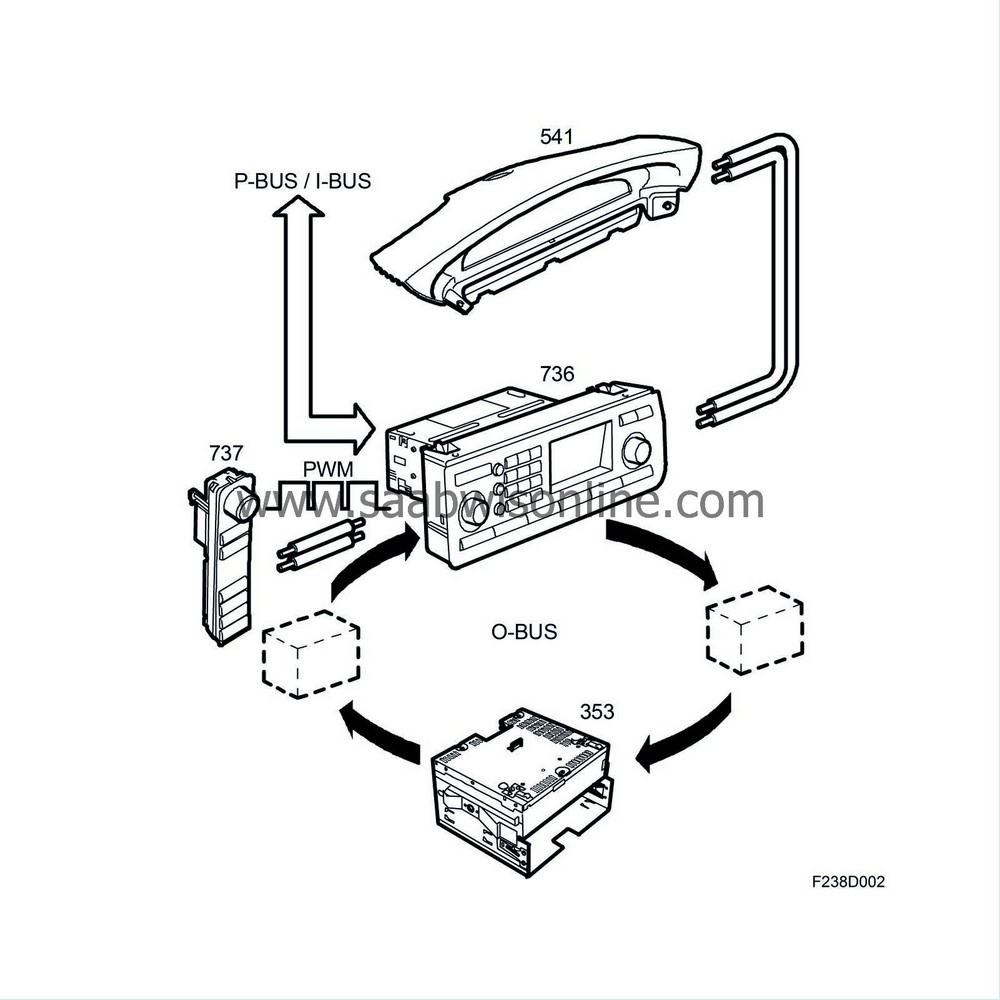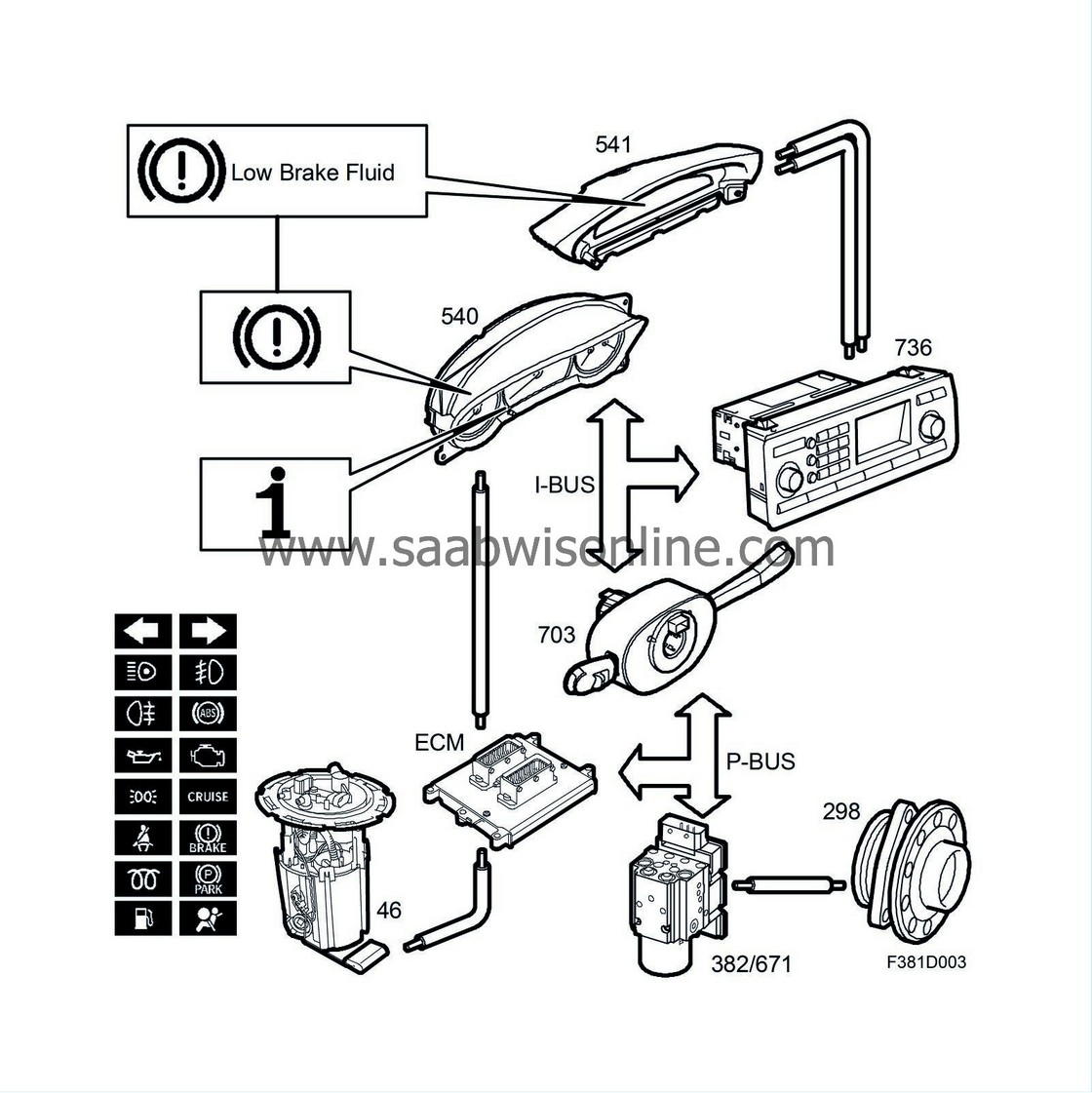PRE-RELEASE
Brief description
| Brief description |
| • |
Main instrument unit, MIU (540)
|
|
| • |
Engine Control Module (ECM)
|
|
| • |
SID (541)
|
|
| • |
Column Integration Module, CIM (703a)
|
|
| • |
Control panel, infotainment, ICM (736)
|
|
| • |
TCS/ESP (382/671)
|
|
| • |
Fuel level sensor (46)
|
|
| • |
Wheel speed sensor (298)
|
|
Description
The main instrument unit is used to convey information to the driver by means of gauges, display information and indicator and warning lamps.The main instrument unit receives information from other control modules via bus messages on the I-bus. The control module processes this information and controls the gauges, display and warning and indicator lamps internally, except for the check engine lamp, which is controlled by the engine control module ECM when it grounds the lamp.
The gauge needles are each controlled by a stepping motor. The instrument graduations, needles, indicator lights and display are illuminated by means of LEDs.
The control modules transmit some bus information, e.g. the mileage and filtered fuel level.
The main instrument unit has its own diagnostic function and sets a diagnostic trouble code in case of a fault.
The main instrument unit incorporates the following:
| • |
Speedometer
|
|
| • |
Odometer/tripmeter
|
|
| • |
Tachometer
|
|
| • |
Fuel level gauge
|
|
| • |
Coolant temperature gauge
|
|
| • |
Turbo boost gauge
|
|
| • |
Warning and indicator lamps
|
|
| • |
Main instrument unit display
|
|
| • |
Instrument and display lighting
|
|
The main instrument unit carries out calculations for the following functions:
| 1. |
Fuel level
|
|
| 2. |
Sums up and stores driven distance
|
|
| SID, display and buttons |

| • |
SID (541)
|
|
| • |
SID control panel, SIDC (737)
|
|
| • |
Control panel, infotainment, ICM (736)
|
|
| • |
Entertainment head unit, EHU (353)
|
|
Description
SID (Saab Information Display) is located above the instrument panel to provide the driver and passenger with easy-to-read information. SID displays information on different vehicle functions using text and symbols.
The SID control panel SIDC (Saab Information Display Control) is located to the left of the centre air vent and comprises a number of buttons and an INFO knob. Commands can be give from the buttons and INFO knob on this unit, which are processed in the infotainment control module (ICM) and displayed on SID.
The ICM unit is located in the middle of the instrument panel and is available in four different levels with varying panels.
ICM is a control unit for information, which means that all general logic and calculation for SID and SIDC is integrated in ICM. This means, for example, that ICM decides what to show on SID and when and for how long it should be displayed.
The ICM control panel is the user interface for audio, telephone, telematics and navigation.
ICM is available in the following four levels:
| • |
ICM 0 is a control module without keypad. ICM 0 is in cars without an audio system.
|
|
| • |
ICM 1 is a control module with only one keypad. The SETTINGS button activates the audio menu in SID.
|
|
| • |
ICM 2 is a control module with a monochrome display, and additional buttons for telephone and Main /Back used for menu selection for the ICM display. The SETTINGS button is replaced with a telephone button.
|
|
| • |
ICM 3 is the top level with 5.8" colour display for navigation, etc. The buttons have the same functions as on ICM 2 but positioned differently.
|
|
SID, SIDC and ICM are three interacting units. SID and ICM communicate via a two-wire communication link. SIDC and ICM communicate via one wire. ICM uses all the bus messages concerning text and symbol messages from all the control modules in the car that are to be displayed on SID. ICM determines the priority of what is to be displayed and for how long.



